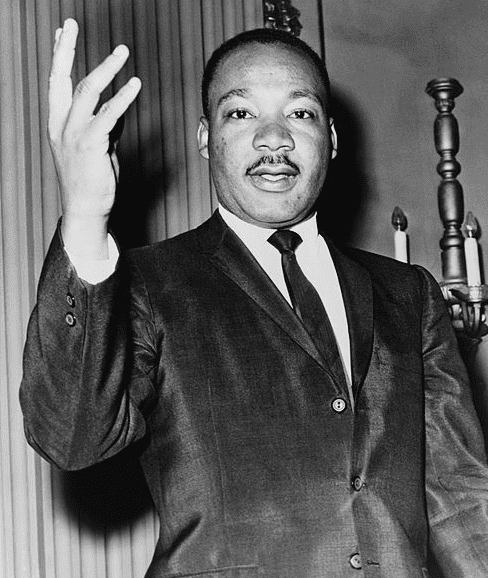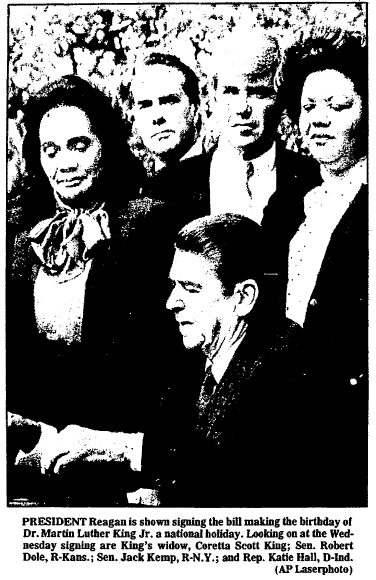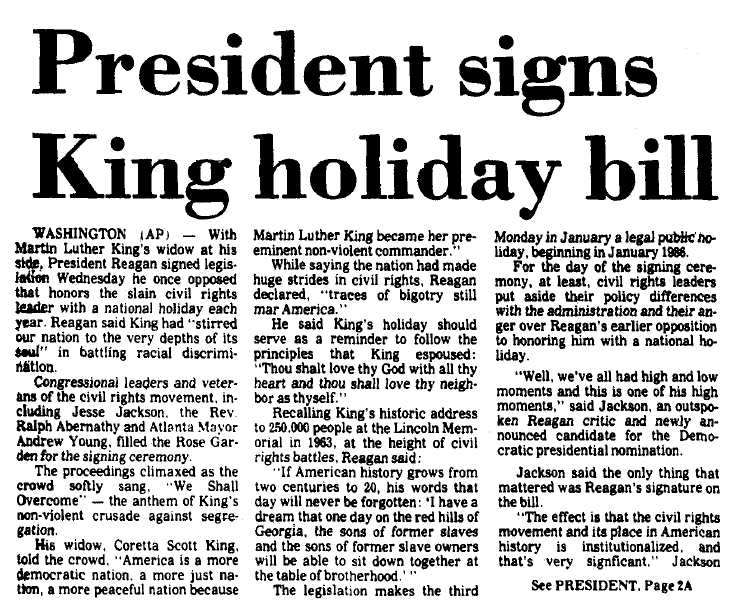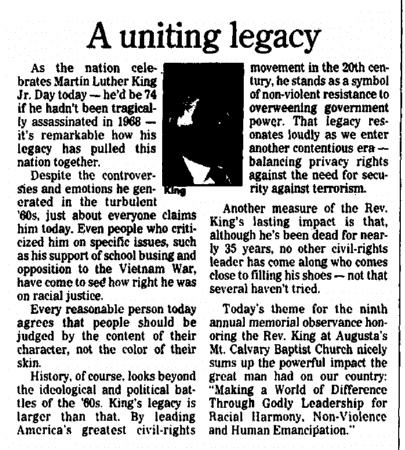Today the United States celebrates the national holiday Martin Luther King Jr. Day, continuing to honor the slain civil rights leader nearly 47 years after his assassination in Memphis, Tennessee, on 4 April 1968. This famous advocate of nonviolence helped raise the civil rights movement to national prominence, forever changing American society. He also was a champion of economic justice for the nation’s poor, and was becoming a leader in the anti-Vietnam War protest movement when he was murdered. Martin Luther King, Jr. won the Noble Peace Prize in 1964.

To many, it would seem that honoring such a pivotal figure with a national holiday would be an obvious choice for America’s government and public, but that was not the case. There was a great deal of opposition to President Reagan’s signing the bill on 2 November 1983, creating the MLK holiday. Reagan himself had earlier opposed the bill, saying that giving federal employees the day off with pay would be too expensive.

Reagan had threatened to veto the bill but backed off when it was passed by such strong veto-proof votes in Congress (78 to 22 in the Senate and 338 to 90 in the House of Representatives). At a press conference two weeks before signing the bill, Reagan said he would sign it “since they (Congress) seem bent on making it a national holiday.” He then went on during the press conference to speculate that FBI documents might reveal King’s communist sympathies. He also wrote Meldrim Thomson, the governor of New Hampshire, that the public’s high regard for King was “based on an image, not reality.”
When the bill first came before the House of Representatives, in 1979, it failed passage by five votes. Senator Jesse Helms (R-North Carolina) led opposition to the bill in the Senate, questioning King’s qualification for such an honor and grousing about his “Marxist” tendencies. When it came up for the Senate vote, John McCain (R-Arizona) was one of the 22 senators who voted against it. Even after the bill’s passage and Reagan’s signature, various states refused to recognize the MLK holiday, with Arizona and New Hampshire being the last two holdouts. It was not until 2000 that Martin Luther King Jr. Day was officially observed in all 50 states.

According to this old news article:
Sen. Edward M. Kennedy, D-Mass., said after the ceremony, “I think as an optimist and someone with hope. I would hope that now, that this is the beginning of this administration’s real commitment to the basic and fundamental rights of people in our society.”
While criticizing Reagan’s firing of three Civil Rights Commission members who criticized the administration, Kennedy added, “I’d rather look to today and think that perhaps the administration will move on a different path in the future than it has in the past.”
In his remarks, Reagan said, “In America, in the ’50s and ’60s, one of the important crises we faced was racial discrimination. The man whose words and deeds in that crisis stirred our nation to the very depths of its soul was Dr. Martin Luther King Jr.”

This editorial reads:
A Uniting Legacy
As the nation celebrates Martin Luther King Jr. Day today—he’d be 74 if he hadn’t been tragically assassinated in 1968—it’s remarkable how his legacy has pulled this nation together.
Despite the controversies and emotions he generated in the turbulent ’60s, just about everyone claims him today. Even people who criticized him on specific issues, such as his support of school busing and opposition to the Vietnam War, have come to see how right he was on racial justice.
Every reasonable person today agrees that people should be judged by the content of their character, not the color of their skin.
History, of course, looks beyond the ideological and political battles of the ’60s. King’s legacy is larger than that. By leading America’s greatest civil rights movement in the 20th century, he stands as a symbol of non-violent resistance to overweening government power. That legacy resonates loudly as we enter another contentious era—balancing privacy rights against the need for security against terrorism.
Another measure of the Rev. King’s lasting impact is that, although he’s been dead for nearly 35 years, no other civil rights leader has come along who comes close to filling his shoes—not that several haven’t tried.
Today’s theme for the ninth annual memorial observance honoring the Rev. King at Augusta’s Mt. Calvary Baptist Church nicely sums up the powerful impact the great man had on our country: “Making a World of Difference through Godly Leadership for Racial Harmony, Non-Violence and Human Emancipation.”
More Articles Related to Martin Luther King, Jr.:
